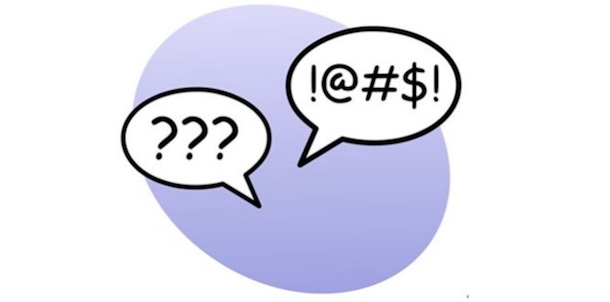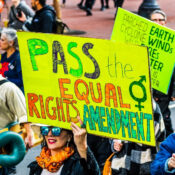Subscribe to The Saturday Evening Post for more articles, cartoons, art, inspiring stories, fiction, humor, and access to our archives.
Although the First Amendment to the Constitution states, “Congress shall make no law… abridging the freedom of speech,” Americans don’t have the luxury of always saying whatever they want. Your right to free speech is limited by where you are, what you say, and how you say it.
Here are six areas where your talk can make you liable in criminal or civil court.
1. Obscenity
Most of the legal cases that concern sex and free speech have involved publications (a form of speech as far as the courts are concerned). Obscenity is not protected by the Constitution, but it has been difficult to define what is obscene. In 1973, the Supreme Court, in Miller v. California, came up with a three-part definition of obscene material. A work is legally considered obscene if
- an average person, applying contemporary community standards, would find that the material appeals to prurient (appealing to sexual desire) interest.
- the work depicts or describes, in an offensive way, sexual conduct or excretory functions, specifically defined by applicable state law.
- taken as a whole, the material lacks serious literary, artistic, political, or scientific value.
This limit on obscene speech also applies to broadcasting. The FCC controls what is allowed on air, so you can’t broadcast sounds or images that could be offensive to your audience or use language inappropriate for children.
However, the Supreme Court has, so far, kept the internet free of obscenity restrictions. You can make whatever statements you want on social media sites, but the owners of those sites have the freedom to censor or delete your content if they find it offensive.
2. Lies
Lying is covered by the First Amendment, except when it’s not. You can be prosecuted for lying under oath in court (it’s called perjury). You can also be charged with misleading authorized investigators. Remember Martha Stewart’s conviction in 2004? She went to prison for lying to investigators about her stock trading.
It is also illegal to run dishonest advertisements. And if you deliberately tell lies about people, you can be hit with a lawsuit in civil court for either libel (if published) or slander (if spoken).
Politicians, on the other hand, have broad protections against being prosecuted for lying, and citizens largely have free rein to criticize their governments, even if the comments are false. Luckily for late night talk show hosts, the First Amendment allows citizens to satirically mock a public figure.
3. Violence
You can’t make offensive remarks or personal insults that would immediately lead to a fight. You also can’t threaten violence to a specific person unless you’re making an obvious exaggeration (for instance, “I’m going to kill my opponent at the polls”). Finally, you can’t knowingly say things that cause severe emotional distress or incite others to “immediate lawless action.”
In 1951, the Supreme Court concluded in Dennis v. United States that the First Amendment doesn’t protect the speech of people plotting to overthrow the government.
4. Students’ Speech
Students have limited rights of free speech while in school. In 1986, Bethel School District v. Fraser upheld the right of a school to suspend a student for making an obscene speech. Hazelwood School District v. Kuhlmeier, 1988, supported a school’s right to censor student newspapers. However, many states are now passing laws to grant broader First Amendment protections to student speech.
5. Offending Your Friends and Coworkers
You don’t have the right to say whatever you want in someone else’s home or other private setting. And, as an employee, believe it or not, you have no free-speech rights at your workplace. The Constitution’s right to free speech applies only when the government — not a private entity — is trying to restrict it. For example, an employer can legally fire an employee whose car bears a campaign bumper sticker he doesn’t like.
It’s a different matter for government employees. In Elrod v. Burns, the Supreme Court ruled in 1976 that the Constitution prohibits government employers from discharging or demoting employees for supporting a particular political candidate.
The law also prohibits speech that shows clear intent to discriminate or sexually harass.
It also prevents employees in medical or financial fields from discussing confidential information outside of work.
6. Expressing Your Political Views
The law has never permitted Americans to protest in any way they wanted. While the government can’t control what you say, how you say it must be subject to what the courts consider an appropriate time, place, and manner.
Legal authorities have a responsibility to protect the safety of attendees at political gatherings and to protect protestors themselves. If authorities think you pose a sufficient risk, you can be restricted to a Free Speech Zone. These have been used since the 1980s, principally to contain protestors at political conventions.
House Bill 347 authorized Secret Service agents to arrest anyone protesting in the president’s or vice president’s proximity. They also have this authority at National Special Security Events. These events have included state occasions, of course, but also basketball championships, the Academy Awards, Olympic events, and the Super Bowl. A conviction can result in up to 10 years in a federal prison (another place where your freedom of speech is limited).
Featured image: Shutterstock
Become a Saturday Evening Post member and enjoy unlimited access. Subscribe now




Comments
We need to protest to get the laws changed. Freedom of speech must be a protected right on the workplace AND In publicly and privately held corporations.
I remember the good ‘ol days when my grandparents, and all the adults on the block (most who had actually fought in WWII, Korea, or Vietnam) would simply say “I don’t agree with him, but, I agree with his right to say it”. They never got worked up by a difference of opinion, nor did they want to boycott every business that had an owner or employee who held a view they did not share. They simply believed in the ideals of the nation as a whole. This was a free country, and you were free to do, say, believe, and act as you wish, no matter how unpopular your ideals.
Now, it seems everyone simply says that the Constitution only protects you from the government on free speech, or any other Constitutional protections. They think it’s perfectly fine to go after someone’s livelihood because of who they voted for or what party they belong to, because the Constitution gives them the right to peacefully assemble and protest, right?
If you don’t share the same ideals that the country was founded upon, and you don’t believe that every person should have the right to make a living while having their own beliefs that aren’t popular with many people, then do NOT call yourself a “patriot” or state that you’re “fighting for democracy” every time you picket a business or black flag someone from the community that you find “offensive”.
We are a Republic because the founding fathers wished that an individuals rights be protected from a majority rule. That is why we are not a strict democracy, and it’s why we have the Constitution. It’s also why you should mind your own business and let people live their lives believing and behaving however they wish, as long as it harms no one and effects no one else’s lives.
I used to see people shrug their shoulders and exclaim “It’s a free country” often, when they were presented with an ideal or belief they did not align themselves with. It’s been a long time since I have heard that.
This country is a lie everything they say they are they ain’t I so hate I was brought over when I was a baby and now there is no escape this country is just the worse and going to get worse than it is already they strive to ruin peoples lives not for greatness not for peace and they care less about us the people they crap all way around now I just practiced freedom of speech you bad then shoot me I wouldn’t even give a damn it be better then living in this world when one world order takes over keep looking up to the devils if that what you do I’m waiting for heaven
#5. Offending Your Friends and Coworkers:
Most Americans are oblivious about the actual TRULY FEW places their 1st Amendment right, to freedom of speech, IS APPLICABLE.
ATTENTION! FREEDOM OF SPEECH is NOT applicable in EVERY BUSINESS, EVERY PRIVATELY OWNED HOME, nor is it applicable in any PUBLICLY OWNED COMPANIES, (i.e. you can buy stock ownership in), nor any company/business, whether or not it receives government funds or NOT.
So recently my husband was an assistant coach in a 2nd grade recreational basketball league. The coach was being ejected and when my husband told the coach he would handle the team he also stated “I know (name) this isnt right”, he was the ejected also. Is this a form of taking my husband’s freedom of speech away? This was his opinion he stated and he did not say it to anyone, but his co coach
Does a preacher, minister, pastor have freedom of speech if it’s about politics????
SO I have a question,
recently I found out that my employer is restricting personnel from uttering the phrase “It’s my Friday” which I feel is part of a normal conversation. The department that is restricting this phrase is not doing so to protect assets or keep information confidential, but rather because one employee complained that it was “offensive” to them. As a side note, it is a 24/7 business in which almost everyone has a different “Friday” which may or may not actually fall on an actual Friday. Are they allowed to do this?
In order to determine where emailed with manipulated pictures and erroneous information is coming from, Why can’t servers be required
To have source notation before they are allowed to forward that info.
This way, we could tell of info was coming from Russia or any unreliable source. And that source could be held legally responsible for their content.
I don’t see how freedom of speech issues are involved here. You can still say anything you want, but must identify yourself.
Fucking americans and their hypocrisy